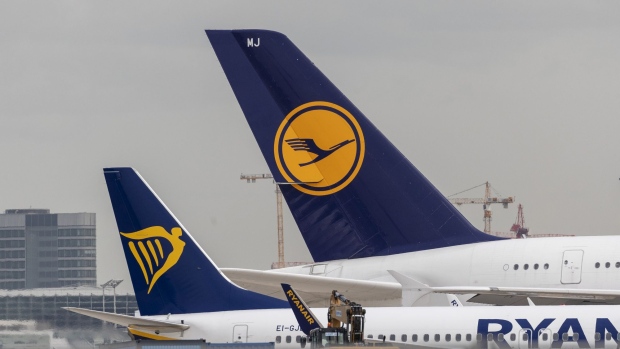Dec 10, 2019
Airlines Hit Out at Jet-Fuel Tax Burden From Europe’s Green Deal
, Bloomberg News

(Bloomberg) -- Want the lowdown on European markets? In your inbox before the open, every day. Sign up here.
Europe’s top airlines attacked EU plans to impose a region-wide kerosene tax as part of a sweeping new environmental strategy, calling the duty unnecessary and unfair and saying investment in sustainable fuels and electric planes would be more effective in reducing carbon emissions.
Chiefs of four of the region’s biggest carriers raised their concerns with European Union Transport Commissioner Adina-Ioana Valean in Brussels Tuesday, with Ryanair Holdings Plc’s Michael O’Leary leading criticism of measures set to be unveiled in the so-called Green Deal package this week.
Higher duties would do “untold economic damage” and represent a “tax grab” by governments, O’Leary said after the meeting. He spoke in his capacity as chairman of the Airlines for Europe lobby group, which said the session had been broadly positive. The heads of Deutsche Lufthansa AG, British Airways parent IAG SA and EasyJet Plc also met with Valean, who took over this month.
Airlines are pushing back against the kerosene levy as the EU moves to overhaul energy-taxation laws unchanged since 2003 as part of a commitment to reducing greenhouse-gas emissions to zero by mid-century. Aviation finds itself increasingly in the firing line as the automotive sector and other industries take strides toward slashing CO2 output.
A4E said in a statement that an incentive-based system coupled with increased investment in sustainable fuels would be a more positive way forward, together with an acceleration of the Single European Sky project, which it estimates would by itself cuts emissions by 10%.
O’Leary said the plan to reform complex air traffic control systems must be implemented if Europe is at all serious about tackling the issue. A purely tax-based approach would be damaging not just for airlines but tourism-based economies in the region, he said.
Defeating the Purpose
“We have to deliver growth in Europe in a sustainable manner,” the CEO said. “Taxation will defeat that purpose. It takes the money away we need to invest in new aircraft.” A4E members alone are spending 170 billion euros ($188 billion) on planes that typically burn 18% less fuel and carry 4% more passengers, he said.
International Air Transport Association CEO Alexandre de Juniac said earlier in Madrid that carriers want to be part of the Green Deal but that “taxes are a politician’s way out” and less effective than a long-term approach requiring more time and effort. Governments and oil companies also need to play a greater role in making sustainable aviation fuels a commercial reality, he said.
While aviation currently accounts for only about 2% of all man-made carbon discharges, emissions have more than doubled since 1990 as a burgeoning global middle class stokes a boom in flights.
The United Nations says the industry is set to overtake power generation as the single biggest CO2 producer within three decades, assuming other sectors build on moves to transition to alternative technologies such as electric cars.
Aviation’s scope for change is limited by the inability of today’s batteries to match jet fuel, which has 50 times the power density, meaning even small hybrid and electric airliners probably won’t be viable for more than a decade. Airbus SE says it could potentially build an emission-free 100-seater by the 2030s, while Boeing Co. aims to halve CO2 output by 2050 from 2005 levels.
In the meantime, airlines are taking a two-pronged approach to cleaning up their acts, extending the use of CO2 offsets like tree planting while also embracing more sustainable propellants, such as kerosene blended with fuel from biomass and synthetic alternatives derived from carbon dioxide and monoxide together with hydrogen extracted from water.
While such fuels aren’t yet financially competitive with kerosene, industry estimates suggest they should become viable once production reaches around 2% of all jet fuel use, something that maybe be attainable by 2025.
To contact the reporters on this story: Lyubov Pronina in Brussels at lpronina@bloomberg.net;Siddharth Philip in London at sphilip3@bloomberg.net
To contact the editors responsible for this story: Anthony Palazzo at apalazzo@bloomberg.net, Christopher Jasper
©2019 Bloomberg L.P.





